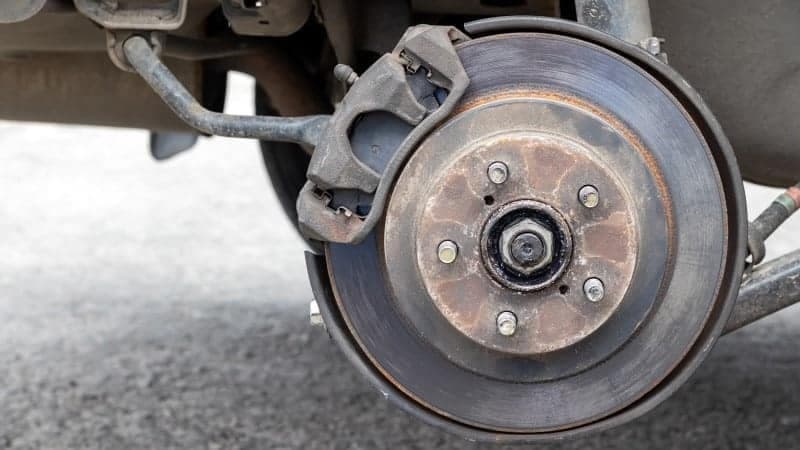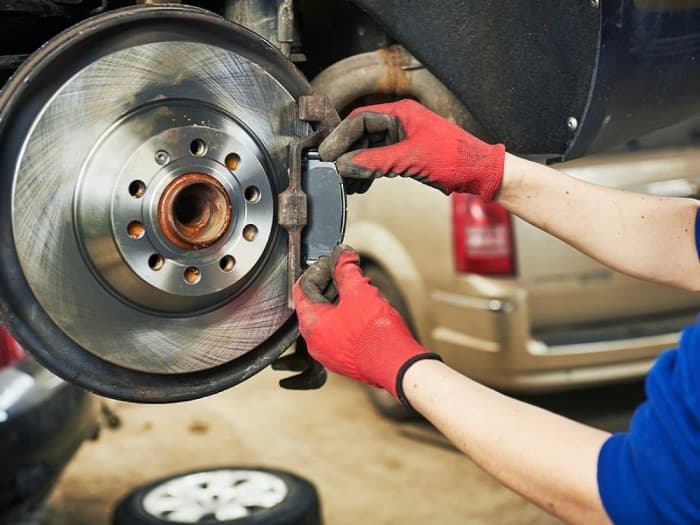Table of Contents
- Introduction about brakes locking up
- Causes of Brakes Locking Up
- Symptoms of Brakes Locking Up
- What to Do When Your Brakes Lock Up
- Preventing Brakes from Locking Up
- Conclusion: Steps to Take When Your Brakes Lock Up, and Your Car Won’t Move
- Frequently Asked Questions about brakes locking up.
Home » What to Do When Your Brakes Lock Up and Your Car Won’t Move
Introduction about brakes locking up
Brakes are an essential safety feature in any car, and when they function correctly, they allow us to stop and slow down as needed. However, when brakes lock up, it can be a frustrating and potentially dangerous situation. If your brakes have locked up and your car won’t move, you may wonder what could have caused the problem and how to fix it.
The causes of brake locking up can range from overheating or excessive wear and tear to a mechanical issue with the brake system. A brake fluid leak or a damaged master cylinder can also cause the brakes to lock up. Symptoms of brakes locking up include resistance when attempting to press the pedal, the inability to stop the car, and possibly even the car pulling to one side if the brakes on one side are lock up. The brakes may also make grinding or squealing noises when locked up.
Preventing brakes from locking up, and regular brake maintenance is vital. This includes replacing worn pads and rotors and checking the brake fluid levels. Additionally, driving at a safe speed and avoiding heavy braking can help prevent overheating the brakes. It is also a good idea to have the brakes inspected by a professional regularly to catch any potential issues before they become more serious.
In this article, we will delve into the topic of brakes locking up and a car that won’t move in more detail. We will discuss the causes of brakes locking up, the symptoms to look out for, what to do when your brakes lock up, and how to prevent brakes from locking up in the first place. By the end of this article, you should have a better understanding of how to address this issue and keep your brakes functioning properly.
Causes of Brakes Locking Up
Several factors can cause brakes to lock up and prevent the car from moving. Some of the most common causes include:
- Overheating or Excessive Wear and Tear: Brakes can lock up due to excessive heat or wear and tear on the brake pads and rotors. This can occur if you use the brakes excessively or drive your car at high speeds for extended periods. The heat generated by the brakes during use can cause the brake pads to expand and make it difficult to press the pedal or stop the car.
- Brake Fluid Leaks: Brake fluid is an essential part of the brake system, as it helps to transmit the force from the brake pedal to the brakes themselves. If there is a leak in the brake fluid system, the brakes may not function properly, leading to the brakes locking up.
- Damaged Master Cylinder: The master cylinder is a key component of the brake system, as it is responsible for converting the force from the brake pedal into hydraulic pressure used to activate the brakes. If the master cylinder is damaged or fails, it can cause the brakes to lock up.
- Mechanical Issues with the Brake System: Several mechanical components within the brake system can cause the brakes to lock up if they become damaged or malfunction. For example, a seized caliper or damaged rotor can cause the brakes to lock up.
It is important to identify the cause of the brakes locking up to properly repair and prevent the issue from happening again. A professional mechanic can diagnose the issue and recommend the appropriate repairs.
Symptoms of Brakes Locking Up

If your brakes have locked up, there are several symptoms you may notice that can indicate a problem. These symptoms include:
- Feeling of Resistance When Pressing the Pedal: One of the most common symptoms of brake locking up is a feeling of resistance when attempting to press the brake pedal. This resistance can make it difficult or even impossible to stop the car.
- Inability to Stop the Car: If the brakes are locked up, the car may not be able to come to a stop even if you press the brake pedal . This can be a potentially dangerous, especially if you are driving at high speeds.
- Car Pulling to One Side: If the brakes on one side of the car are locked up, the car may pull to one side when attempting to stop. This can be a sign that there is an issue with the brakes on that side of the car.
- Grinding or Squealing Noises: If the brakes are locked up, they may make grinding or squealing noises when used. These noises indicate that the brakes are not functioning properly and may need repair.
It is important to pay attention to these symptoms and address any issues with the brakes as soon as possible to avoid further damage or safety hazards. If you notice any of these symptoms, it is a good idea to have your brakes inspected by a professional mechanic.
What to Do When Your Brakes Lock Up
If your brakes have locked up and your car won’t move, it is important to remain calm and take the necessary steps to stop the car safely. Some steps you can take include:
- Find a Safe Place to Stop: You should first find a safe place to stop the car. If you are on a busy road, you may need to signal to other drivers and use your hazard lights to indicate that you cannot move.
- Use the Emergency Brake or Shift into a Lower Gear: Depending on the situation, you may be able to use the emergency brake or shift into a lower gear to help bring the car to a stop. The emergency brake is not connected to the main brake system and you can use to stop the car in an emergency. Shifting into a lower gear can also help slow down the car and bring it to a stop.
- Turn Off the Engine and Engage the Parking Brake: Once the car stops, it is important to turn off the engine and engage the parking brake. This will help to prevent the car from rolling and potentially causing an accident.
- Have the Brakes Inspected and Repaired: It is essential to have the brakes inspected and repaired by a professional as soon as possible once the car stops. A mechanic can diagnose the issue and recommend the appropriate repairs.
Following these steps, you can stop the car safely and avoid further damage or safety hazards. It is also a good idea to familiarize yourself with these steps in advance so that if you ever experience brakes locking up while driving you are prepared.
Preventing Brakes from Locking Up
While brakes can lock up due to various factors, there are some steps you can take to prevent this issue from occurring. Some ways to prevent brakes from locking up include:
- Regular Brake Maintenance: Regular brake maintenance is key to ensuring your brakes function properly. This includes replacing worn pads and rotors and checking the brake fluid levels. Regular maintenance allows you to catch potential issues before they become more serious and prevent the brakes from locking up.
- Drive at a Safe Speed and Avoid Heavy Braking: Driving safely and avoiding heavy braking can help prevent overheating the brakes and causing them to lock up. It is also a good idea to give yourself plenty of distance between your car and the one in front of you so that you have time to brake gently and avoid sudden stops.
- Have the Brakes Inspected by a Professional: It is important to have the brakes inspected by a professional regularly to catch any potential issues before they become more serious. A mechanic will be able to identify any problems with the brake system and recommend the necessary repairs.
By following these steps, you can help prevent the brakes from locking up and ensure that your car is safe to drive. Regular brake maintenance and inspections are essential to keeping your brakes in good working order and preventing issues like brakes locking up from occurring.
Conclusion: Steps to Take When Your Brakes Lock Up, and Your Car Won’t Move
In conclusion, brakes locking up and a car that won’t move can be frustrating and potentially dangerous issues. Several factors can cause the brakes to lock up, including overheating or excessive wear and tear, brake fluid leaks, a damaged master cylinder, and mechanical issues with the brake system. Symptoms of brakes locking up include resistance when pressing the pedal, the inability to stop the car, the car pulling to one side, and grinding or squealing noises.
If your brakes have locked up, it is important to remain calm and take the necessary steps to stop the car safely. This includes finding a safe place to stop the car, using the emergency brake or shifting into a lower gear, turning off the engine and engaging the parking brake, and having the brakes inspected and repaired by a professional.
Preventing brakes from locking up, and regular brake maintenance is key. This includes replacing worn pads and rotors and checking the brake fluid levels. It is also a good idea to drive safely, avoid heavy braking, and have the brakes inspected by a professional regularly. By following these steps, you can help ensure that your brakes are functioning properly and prevent the issue of brakes locking up from occurring.
Frequently Asked Questions about brakes locking up.
What causes brakes to lock up and prevent the car from moving?
Several factors can cause brakes to lock up and prevent the car from moving, including overheating or excessive wear and tear, brake fluid leaks, a damaged master cylinder, and mechanical issues with the brake system.
What are the symptoms of brakes locking up?
Some common symptoms of brake locking up include resistance when pressing the brake pedal, the inability to stop the car, the car pulling to one side, and grinding or squealing noises.
What should I do if my brakes lock up and my car won’t move?
If your brakes have locked up and your car won’t move, it is important to remain calm and take the necessary steps to stop the car safely. This includes finding a safe place to stop the car, using the emergency brake or shifting into a lower gear, turning off the engine and engaging the parking brake, and having the brakes inspected and repaired by a professional.
How can I prevent my brakes from locking up?
To prevent your brakes from locking up, it is important to perform regular brake maintenance, including replacing worn pads and rotors and checking the brake fluid levels. It is also a good idea to drive safely, avoid heavy braking, and have the brakes inspected by a professional regularly.
Can I drive my car if the brakes are locked up?
It is not safe to drive a car with locked brakes. If your brakes have locked up, it is important to stop the car as soon as possible and have the brakes inspected and repaired by a professional.


